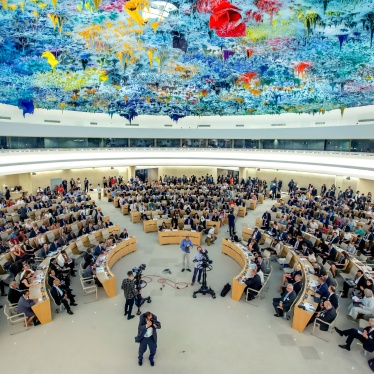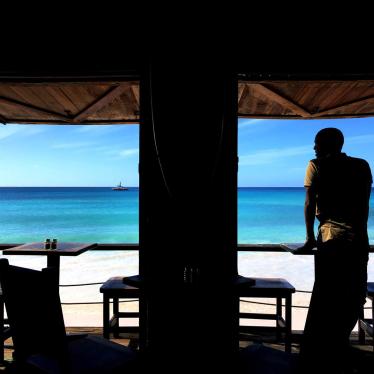Introduction
- Human Rights Watch (HRW) respectfully presents this submission for Saint Lucia’s third Universal Periodic Review (UPR). The submission addresses the rights of lesbian, gay, bisexual, and transgender (LGBT) people in the country and focuses on the two issues that predominated State recommendations during Saint Lucia’s second UPR in November 2015:
- Decriminalization of same-sex conduct; and
- Adoption of comprehensive anti-discrimination legislation protecting LGBT people
- Saint Lucia rejected both recommendations in the past UPR cycle. The present submission aims to remind Saint Lucia that its inaction on these recommendations places it in violation of its international human rights obligations.[1] In addition, to illustrate the impact of the country’s current legal defects, the submission will draw from HRW’s 2017 report “I Have to Leave to Be Me”: Discriminatory Laws against LGBT People in the Eastern Caribbean,[2] featuring interviews with impacted LGBT Saint Lucians.
Decriminalization of Same-Sex Conduct
- Section 133 of Saint Lucia’s Criminal Code on “buggery” criminalizes consensual same-sex conduct. Section 132 of the Criminal Code on “gross indecency” exempts from punishment any act “committed in private between an adult male person and an adult female person, both of whom consent,” but lacks protection for private acts between same-sex couples.
- During the second cycle of Saint Lucia’s UPR in November 2015, Slovenia, Spain, the United States of America, Uruguay, and Chile recommended that Saint Lucia decriminalize consensual sexual relations between consenting adults of the same sex.[3] Australia, Germany, and the Netherlands recommended that Saint Lucia repeal legislation that discriminates against LGBT and intersex people.[4] Saint Lucia rejected these recommendations.[5]
- Prime Minister Allen Chastanet said as recently as October 2019 that his government has not arrived at any “definitive decision” regarding repealing or retaining the buggery provision, reportedly citing religion and the “many definitions” of human rights.[6]
- International human rights law establishes that matters of sexual orientation and gender identity, including consensual sexual relations, are protected under the rubric of the right to privacy and the right to be protected against arbitrary and unlawful interference with, or attacks on, one’s private and family life and one’s reputation or dignity. Criminalizing same-sex intimacy violates these international obligations, which has been affirmed by Independent Expert on protection against violence and discrimination based on sexual orientation and gender identity.[7]
- While buggery and gross indecency laws in Saint Lucia are seldom enforced against consenting persons, their impact is pernicious. Laws criminalizing same-sex conduct reinforce already-existing societal prejudices, effectively giving social and legal sanction for discrimination, violence, stigma, and prejudice against LGBT individuals.[8]
- Since Saint Lucia’s last UPR, HRW conducted in-country research that evidences the discrimination, violence, stigma, and prejudice that beset LGBT people’s enjoyment of basic rights. For example, Toby, a 38-year-old gay man in Saint Lucia, described to HRW experiences of exclusion and ostracism within the family, which drove him to five separate suicide attempts and to leave his home.[9] Toby also said he was pelted with stones in 2015 during carnival celebration. In April 2016, he and his partner were also attacked as they were entering their home one afternoon: “[I knew] it was motivated by us being gay because the term ‘buller’ was used. As we were entering the house, a car pulled out, two persons jumped out…a gun was raised and they tried to pull the trigger, but the trigger did not work. I told my boyfriend to run. They stabbed me, several times, the deepest one was below the navel. My boyfriend was also attacked with stones.”[10]
- Richard, a 20-year-old gay man working in a civil society organization in Saint Lucia, has received online threats because of his sexual orientation that say things such as “no gays” and “we will kill you and beat you up.”[11] Richard told Human Rights Watch that when he was walking alone in 2015, a hostile group of men followed him, yelling things like “oh battyman, don’t make us beat you there.”[12] On another occasion, he was walking with his sister when someone yelled, “Oh he’s gay, let’s burst his head, stab him, and kill him!”[13]
- Saint Lucia should:
- Repeal Section 133 of the Criminal Code, which criminalizes consensual same-sex conduct.
- Amend Section 132 of the Criminal Code to exempt from punishment all private consensual sexual acts, whether by persons of the same or different sex.
Adoption of Comprehensive Anti-Discrimination Legislation Protecting LGBT People
- Saint Lucia currently does not have any comprehensive laws that prohibit discrimination on grounds of gender identity and sexual orientation, including in the housing, access to education, and health care contexts. Section 131 of Saint Lucia’s 2006 Labour Act does prohibit employers from “unfairly dismissing” a person on the basis of their sexual orientation, but does not prohibit such dismissal on the basis of gender identity.
- During the second cycle of Saint Lucia’s UPR in November 2015, Slovenia, Germany, Canada, and Chile recommended that Saint Lucia adopt legislation prohibiting discrimination on the basis of sexual orientation and gender identity.[14] France, Brazil, the Netherlands, Spain, and Uruguay recommended that Saint Lucia strengthen its commitment to anti-discrimination, including through awareness-raising.[15] Saint Lucia accepted the latter set of recommendations but did not commit to the former, which called for specific legislative change.[16]
- The OAS has adopted several resolutions condemning “acts of violence and human rights violations perpetrated against individuals because of their sexual orientation and gender identity,” and has urged states “to adopt the necessary measures to prevent, punish, and eradicate” discrimination.[17] Core treaties like the International Covenant on Civil and Political Rights (ICCPR), the International Covenant on Economic, Social and Cultural Rights (ICESCR), and the American Convention on Human Rights (ACHR)—which Saint Lucia should ratify, as recommended by many States during Saint Lucia’s last UPR—have been interpreted by courts and authoritative treaty bodies to ban such discrimination, as have a variety of other international instruments and sources of law.[18]
- In this lacking legal context, discrimination against LGBT people seeps into everyday activities, whether it be availing of services such as health care, school, or riding a bus, or social activities such as going to the movies or shopping. Notably, LGBT people who face discrimination in areas other than employment lack any legal avenue to seek redress for themselves or accountability for perpetrators.
- Saint Lucia should:
- Pass comprehensive anti-discrimination legislation that prohibits discrimination on grounds of gender identity and sexual orientation—including in the employment, housing, access to education, and health care sectors—and specifies effective measures to identify, prevent, and respond to such discrimination.
- Amend Section 131 of Saint Lucia’s 2006 Labour Act prohibiting employers from “unfairly dismissing” a person on the basis of their sexual orientation to include gender identity.
[1] For authoritative guidance on the protection afforded by international human rights law against discrimination based on
sexual orientation and gender identity, see “Yogyakarta Principles on the Application of International Human Rights Law in relation to Sexual Orientation and Gender Identity” (2006), http://yogyakartaprinciples.org/principles-en/.
[2] Human Rights Watch, “I Have to Leave to Be Me”: Discriminatory Laws against LGBT People in the Eastern Caribbean (Human Rights Watch, 2017), https://www.hrw.org/report/2018/03/21/i-have-leave-be-me/discriminatory-laws-against-lgbt-people-eastern-caribbean.
[3] Human Rights Council, Report of the Working Group on the Universal Periodic Review: Saint Lucia, U.N. Doc. A/HRC/31/10 (December 15, 2015), paras. 88.60, 88.66, 88.67, 88.68, 88.69.
[4] Ibid, paras. 88.61, 88.62, 88.64.
[5] Human Rights Council, Report of the Working Group on the Universal Periodic Review: Saint Lucia, U.N. Doc. A/HRC/31/10/Add.1 (March 14, 2016).
[6] “Saint Lucia PM Says No Decision Yet On Buggery Laws,” St. Lucia Times (October 30, 2019), https://stluciatimes.com/saint-lucia-pm-says-no-decision-yet-on-buggery-laws/
[7] International Covenant on Civil and Political Rights (ICCPR), adopted December 16, 1966, G.A. Res. 2200A (XXI), 21 U.N. GAOR Supp. (No. 16) at 52, U.N. Doc. A/6316 (1966), 999 U.N.T.S. 171, entered into force March 23, 1976. Articles 2 and 26 of the ICCPR affirm the equality of all people before the law and the right to freedom from discrimination. Article 17 protects the right to privacy. See also Human Rights Council, Report of the Independent Expert on protection against violence and discrimination based on sexual orientation and gender identity, U.N. Doc. A/72/172 (July 19, 2017), paras. 32-35; Toonen v. Australia, 50th Sess., Communication No. 488/1992, U.N. Doc CCPR/C/50/D/488/1992, April, 14, 1994, sec. 8.7; ACHR, art. 11; Inter-American Commission on Human Rights, “Violence against lesbian, gay, bisexual, trans and intersex persons in the Americas” (Inter-American Commission on Human Rights, 2015), pp. 85, http://www.oas.org/en/iachr/reports/pdfs/ViolenceLGBTIPersons.pdf.
[8] Inter-American Commission on Human Rights, “Violence against lesbian, gay, bisexual, trans and intersex persons in the Americas,” pp. 60-62. See also Human Rights Watch, This Alien Legacy: The Origins of “Sodomy” Laws in British Colonialism (Human Rights Watch, 2008), https://www.hrw.org/report/2008/12/17/alien-legacy/origins-sodomy-laws-british-colonialism.
[9] Human Rights Watch, “I Have to Leave to Be Me”, p. 34.
[10] Ibid, pp. 40-41, p. 46.
[11] Ibid, p. 46
[12] Ibid.
[13] Ibid.
[14] Human Rights Council, Report of the Working Group on the Universal Periodic Review: Saint Lucia, U.N. Doc. A/HRC/31/10 (December 15, 2015), paras. 88.60, 88.62, 88.65, 88.69.
[15] Ibid, paras. 88.59, 88.63, 88.64, 88.70, 88.71.
[16] Human Rights Council, Report of the Working Group on the Universal Periodic Review: Saint Lucia, U.N. Doc. A/HRC/31/10/Add.1 (March 14, 2016).
[17] Organization of American States, General Assembly, “Human Rights, Sexual Orientation, and Gender Identity,” AG/RES. 2435 (XXXVIII- O/08), resolution adopted at the fourth plenary session, June 3, 2008. See also OAS resolutions entitled “Human Rights, Sexual Orientation and Gender Identity,” adopted in 2009 (AG/RES. 2504), 2010 (AG/RES. 2600), 2011 (AG/RES. 2653), and 2012
(AG/RES. 2721); OAS resolutions entitled “Human Rights, Sexual Orientation, and Gender Identity and Expression,” adopted
in 2013 (AG/RES. 2807) and 2014 (AG/RES. 2863).
[18] International Covenant on Economic, Social and Cultural Rights (ICESCR), adopted December 16, 1966, G.A. Res. 2200A
(XXI), 21 U.N. GAOR Supp. (No. 16) at 49, U.N. Doc. A/6316 (1966), 993 U.N.T.S. 3, entered into force January 3, 1976; UN Committee on Economic, Social and Cultural Rights, General Comment No. 20, Nondiscrimination
and economic, social and cultural rights (Article 2, paragraph 2 of the International Covenant on Economic,
Social and Cultural Rights), E/C.12/GC/20 (2009), http://www.refworld.org/docid/4a60961f2.html (accessed March 18, 2020),
para. 32 (“’Other status’ as recognized in article 2, paragraph 2, includes sexual orientation”). Inter-American Court Of Human Rights, Atala Riffo And Daughters v. Chile, Judgment of February 24, 2012, Inter-Am. Ct.H.R., (Ser. C) No. 239 (2012), para 91 (“Bearing in mind the general obligations to respect and guarantee the rights established in Article 1(1)of the American Convention, ... the Inter-American Court establishes that the sexual orientation of persons is a category protected by the Convention. Therefore, any regulation, act, or practice considered discriminatory based on a person’s sexual orientation is prohibited. Consequently, no domestic regulation, decision, or practice, whether by state authorities or individuals, may diminish or restrict, in any way whatsoever, the rights of a person based on his or her sexual orientation.”).






